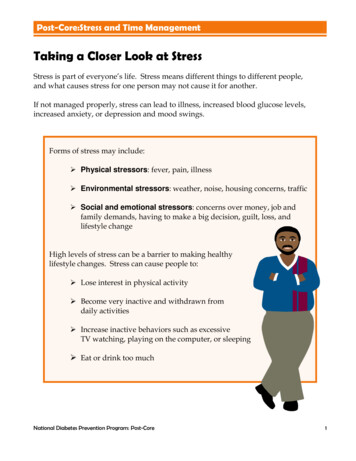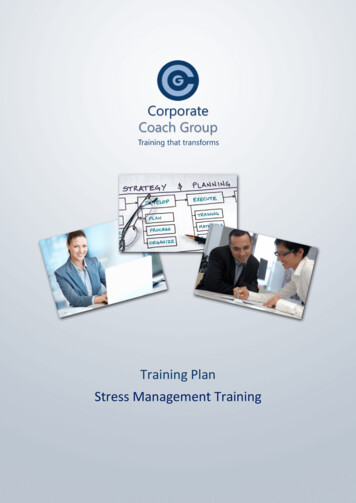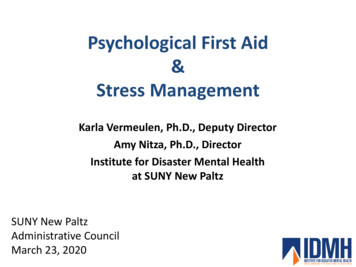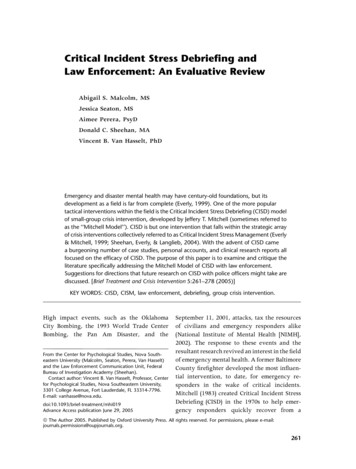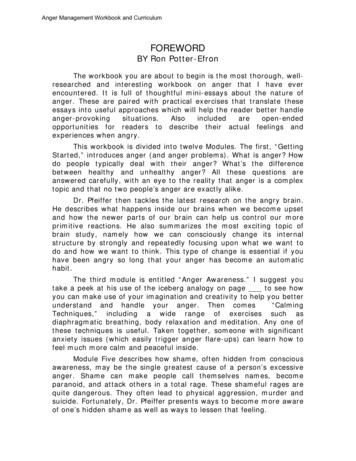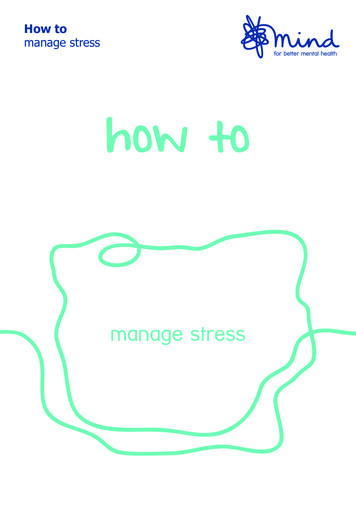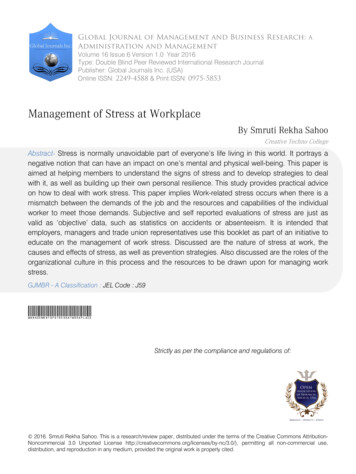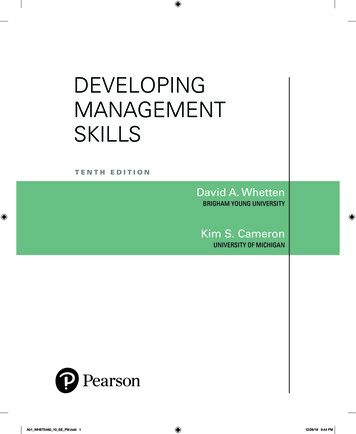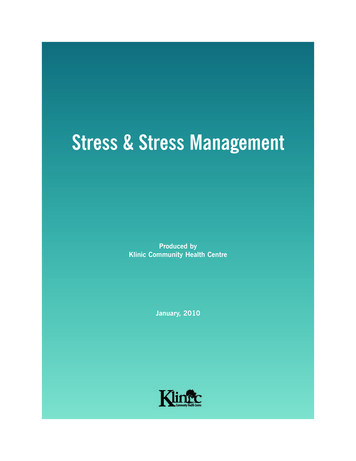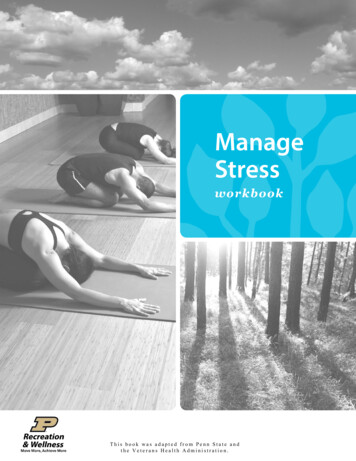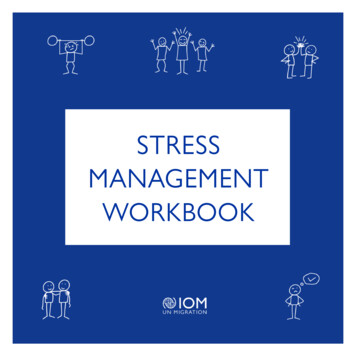
Transcription
STRESSMANAGEMENTWORKBOOK1
PERSONAL DETAILSNAMECONTACT DETAILSThis is a workbook for the StaffWelfare platform “Stress Management”.The aim is to help you understand theimpact stress can have.To visit the platform, please contactStaff Welfare, swo@iom.intSTRESS MANAGEMENT WORKBOOK
Do you know what the effectsof stress are?Have you wondered whatmakes us stressed?What are the ways to copewith stress?Sometimes, when we are in difficult situations,we become stressed for a variety of reasons.This can affect our wellbeing and functioning atwork and personal life.It is therefore useful to review and understandour coping habits and adjust them.The exercises in this workbook will help youlearn about your current approach to stressand difficult situations.STRESS MANAGEMENT WORKBOOK5
THE EFFECTSOF STRESSStress is an adaptive response that we all experience whenwe face something we interpret as a stressor, e.g. difficultenvironment or illness. It affects our minds, bodies andemotions. It is “the non-specific response of the body to anydemand for change” (Hans Selye, 1936)We all need a certain amount of stress in our lives to be ableto function. In fact, stress can be positive. However, theeffects of too much stress can have a negative impact.Stress leads to the release of hormones that can have avariety of effects.WorkThe level at which we work and think can be negatively affected.There are four levels at which we can work:Level OneLevel TwoLevel ThreeLevel FourDownloading – you ignore what is different in the new situationand do what you did before.You see the difference but still do what you did beforeYou see the difference and adapt what you did previouslyYou recognise that this is a brand new situation and you carry outnew actions to respond to the situation. (source: ottoscharmer.com)Ideally we should operate at Levels Three and Four. When we are stressed, we often work atLevel One or Two which aren’t effective except in situations such as brushing your teeth.MemoryStress and worry can negatively affect your memory and take space in your mind. Thiswill leave you with less capacity to think and/or make decisions. If you feel your thinkingand/or decision making is affected, then have a break for even a minute, take some deepbreaths and return to your work. If your thinking is significantly affected, then ask someone else to take over. We are all human beings and have fallible moments.Attention and decision makingWhen we are stressed or worried, it can affect our ability to pay attention. We can focuson too little or the wrong issue or really consider far too much. We can forget to payattention to the right information by focusing on too much or too little or the wrongaspect. We can become forgetful and this will lead to poor decision making.STRESS MANAGEMENT WORKBOOK7
Past events returningExperiencing a critical incident or severe stress can bring back memories of similar past events.You could remember a particular part of the event, the sounds or smells associated with thatmemory.Feelings and emotionsEXERCISEWhat are your own stress reactions?Body e.g. tense shoulders, irregular breathing, not sleepingYour emotions are likely to be unusual, you could be OK one minute and then very fearful, thenhappy and then angry and then very sad. You can feel frightened and this can affect your abilityto pay attention and focus.Impact on your ability to sleep, eat and drinkEating, drinking and sleeping can be affected by stress and worry. Stress can destabilize our normal patterns.Mind e.g. problems concentrating, becoming forgetfulExcess behavioursOveruse of substances, e.g. nicotine, alcohol and excess behaviours, e.g. eating too much do nothelp you to cope effectively. At best, these behaviours provide very short term relief.Emotions e.g. low motivation, becoming irritable for no special reasonBreathingStress and worry can affect your body including your breathing. Ideally you should be taking 1218 breaths a minute. When people are stressed they tend to shallow breathe or take less thansix breaths a minute. Here’s an app that could help: Stop, breathe, think.STRESS MANAGEMENT WORKBOOK9
WHAT MAKESUS STRESSED?EXERCISEPlease write down your stressorsInternal stressors e.g. mood, feeling ill, feeling sad, angry, worriesInternal (mood, health issues) and external stressors(temperature, security situation, expectations at work) canlead to stress as a reaction in each of us.Each person has their own individual set of stressors and willreact differently. Your reaction to a stressor can also varydepending on your mood and energy.External stressors e.g. work environment, security situation, family issuesWhich of these stressors can you do something aboutand which ones do you have to accept?STRESS MANAGEMENT WORKBOOK11
WAYS IN WHICHWE COPE WITHSTRESSPhysical actionsHow much do you do to keep fit every week? Regular exercise is vital to manage stress.Too much or too little is not helpful.Healthy livingHow healthy is your diet and how well do you sleep?Your body, heart and mind need constant nourishment and appropriate rest and lookingafter so that you can function effectively.It is important that we address stress as it occurs.If we ignore it, then it builds up, and can make life difficult forus later on. For example, not dealing effectively with stresscan eventually lead to cumulative stress.Healthy workingOur coping habits help us deal with the day to day stresswe encounter. These habits have developed over the years.Some of them are helpful and others are not.We all have ways in which we cope with stress. We eachhave four different types of coping habits:Social supportHow positive are your working habits? How is your concentration? How much time doyou spend at work? How productive are you? Healthy work habits lead to better stressmanagement and productivity.Social support is vital as it alleviates stress.You don’t have to have 50 friends but you need at least one or two people in whom youcan trust and confide. Looking after yourself emotionally is also vital.STRESS MANAGEMENT WORKBOOK13
EXERCISEHealthy Working e.g. following a priority list, healthy work-life balancePlease write down your current positive and negativecoping strategies and evaluate whether they are effectiveor not (place a tick beside the ones that are helpful).Physical actions e.g. going to the gym regularly, daily walkSocial Support e.g. work environment, security situation, family issuesHealthy Living e.g. healthy diet, sleeping wellSTRESS MANAGEMENT WORKBOOK15
TIPS ANDSUGGESTIONSHere are some suggestions that may help you.If you have health issues, remember to check with yourdoctor before trying any of these suggestions.Physical actions10 minutes of physical activity three times a day can improve mood, relieve depressionand increase feelings of wellbeing.Good posture, i.e. sitting up straight helps you to take in more oxygen and perform better during stressful activities such as deadlines.Acupressure Take the thumb and index finger of one hand and squeeze the soft spot onthe palm (between both fingers) on the other hand. Hold for three countsand switch. Using the same fingers, squeeze each of the fingers all over.Rub each joint in a circular motion.Hold each finger at its base and pull gently to stretch it, sliding your grip upthe finger and off the tip. For extra benefits, use a dab of lavender oil whichcan aid relaxation (make sure that you are not allergic to lavender oil).Hold a small hard ball between both hands and roll it around. Place the ballon the floor and put one foot on top of it and move the ball around the soleand toes of that foot. Repeat with the other foot.Rub your ear-lobes with your fingers slowly. This will help you relax.Repetitive actions can soothe, i.e. sewing, crafts, etcBreathing. It is important to practice regular deep breathing. This will help you think and actmore constructively. You should be taking 12-18 deep breaths per minute. If you are not, then itis likely you are breathing in a shallow way. Here are some exercises:Intentional breathing:Sit straight in a comfortable chair. Place your hands on your sides just above yourhip bones. Inhale deeply into your abdomen (your hands should move as yourSTRESS MANAGEMENT WORKBOOK17
body expands and contracts). Exhale. Repeat this three to four times.Move your hands to the middle of your ribs. Continue breathing and feel yourbody expand etc. Repeat this three to four times. Move your hands to your collarbones and, again, feel your body moving. Repeat three to four times. You havere-learned how to carry out a full breath.Foundation Breathing:Sit comfortably with your back straight, feet flat on the ground, eyes closed andhands in your lap. Start breathing in and out very slowly. This can be helped bylistening to slow music with a beat and regulating your breath with the beat ofthe music (twelve to eighteen breaths per minute).Healthy livingFood and drink. Even if you don’t feel like eating and drinking healthily, it is important to continueWorkIf you find that you are forgetful and/or find it difficult to concentrate, make sure that you arebreathing properly first. Then perhaps take a short break during which you carry out a smallphysical activity to relax. It may be helpful to pair up with a colleague and think about how youcan support each other and double-check your work. Remember to be patient with yourselfespecially if you are in a very stressful situation.If the situation is very stressful, then think about the stressors that are present and make a list.Separate them into ones that you can do something about and those that you have to accept.Whose problem is it? How will you talk to them to solve the problem or is it one that you needto address within yourself?Make sure that you pay attention to IOM and UNDSS security advice and follow it, both atwork and home. If you don’t understand the advice, ask a security colleague. Be careful aboutwhat information you pay attention to. Only listen to news from reliable sources.to do so. Try to eat a healthy well balanced diet including alkaline foods that can reduce stressreactions, e.g. lentils, sweet potato, eggplant, garlic, carrot, ginger, beetroot, broccoli, Brusselssprouts and avocados.Take regular breaks at work – ten minutes every hour.Keep some dried fruits and nuts handy. Snack on these instead of sugar to avoid blood sugar highs.productive? How did you spend your time? What changes do you need to make?Eat three meals a day. Your last meal should be eaten at least three hours before you go to bed.Work culture is the character and personality of your organization (HR Insights). Do you feelChoose ginseng tea instead of coffee –it gives your metabolism a kick start like coffee and soothesanxiety as well.positive about going to work? Is the culture supportive? If it is negative, what can you do toaddress it? What should you talk to leaders about?Sleep. If you find it difficult to go to sleep then get out of bed and do something active –music,reading etc. until you feel ready to go to sleep. Another strategy is to lie in bed and rub yourstomach gently and focus on slowing your breathing down until you fall asleep.If you do not feel well, make sure that you seek medical advice before assuming that you can manage by yourself.Plan your week. Look at and analyse what you did last week. How much of your week wasIs someone is harassing or bullying you? What impact does it have on your life? What have youdone about it? It could be helpful to speak to the Ethics Office or the Ombudsperson.STRESS MANAGEMENT WORKBOOK19
Social support and emotionsExcess behavioursTalk to partners, friends and family. Social support has been proven to lower stress. RememberOveruse of cigarettes and other substances and excess behaviours, e.g. eating too much doesnot help you to cope effectively. It is best to speak to a counsellor who will help you developalternative strategies to manage worry and stress.to be supportive of each other and plan for how you will cope as an individual and family ratherthan thinking about the difficulties themselves.Plan for the worst case scenario and rehearse it and then you will know what to do. Make sureyou seek advice from IOM Security as needed.Be careful in how you explain any difficult situation to children. It is best to be truthful but onlytell them a few things at a time. Double-check that they have understood you correctly. Usingstories about how fictitious children have coped can help. Remember that young children (andsome teenagers/young adults) will not be able to speak about their emotions but they are likelyto act them out. Be patient with them.Try to follow a normal routine as much as possible. Think about how you can do this, includingtalking about everyday things, dreams you or your family or friends have, maintaining leisure andsocial activities.There may be times when you cannot show your emotions but it is important to acknowledgethem when you can. It is important to share your emotions and concerns with, at least, one person. Keeping feelings and worries to yourself does not really help.Especially after an emotional experience, it is important to process it at both the feeling level aswell as cognitively, i.e. acknowledge the feeling and think about what the experience has taughtyou.Feeling frightened can affect your ability to pay attention and focus. Think about what you arePast events returningExperiencing a critical incident or severe stress can bring back memories of similar past events.If this happens, you can try one or more of the following:Write down what happened. What you did well and what could have been done differently.Praise yourself for what you did. Forgive yourself if needed.Think of a positive memory of another event or time. When the memory of the incident comesback, think of the positive memory instead.Wear a bracelet or item that reminds you of good times and then touch the bracelet or itemwhenever the negative memory returns.Other activitiesListening to music has been proven to reduce stress responses such as high blood pressure andelevated heart rate.fearful of and then work out what you can do to address the issues. If there is little that can bedone, what could you do to accept and address your fear?People working near plants reacted 12 percent faster and were less stressed based on bloodpressure readings taken before and after a typing assignment.Practicing your religion or faith can be helpful.Visualization reduces stress. Sit comfortably and focus on your breathing with your eyes closed.Keep concentrating on your breathing for five minutes and then focus on a picture or music thatreminds you of ‘Peace’.STRESS MANAGEMENT WORKBOOK21
EXERCISE: My PlanTake another look at your coping strategies and write downchanges you want to make. Make sure these are manageableand doable in your current situation. What will you do toensure that you focus on positive habits? Who will supportyou to achieve your goals? When will you review them?Healthy WorkingPhysical actionsSocial SupportHealthy LivingIf you have any questions or need a confidential discussion,please contact Staff Welfare, swo@iom.int2223
swo@iom.int24
STRESS STRESS MANAGEMENT WORKBOOK It is important that we address stress as it occurs. If we ignore it, then it builds up, and can make life difficult for us later on. For example, not dealing effectively with stress can eventually lead to cumulative stress. Our coping habits help us deal
